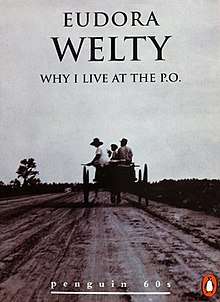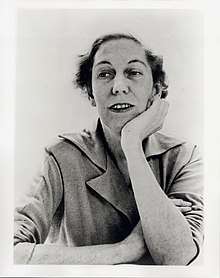Why I Live at the P.O.
"Why I Live at the P.O." is a short story written by Eudora Welty, American writer and photographer. It was published in her collection of stories named A Curtain of Green (1941).[1] The work was inspired by a photograph taken by Welty that depicts a woman ironing at the back of a post office. The story is classified as an example of Southern realism. "Why I Live at the P.O." is one of Welty's most popular and frequently anthologized stories.[2]

Plot
Sister, the narrator, who is also a protagonist, begins her story when her younger sister, Stella-Rondo, comes back home after separating from her husband – Mr. Whitaker. Stella brings with her a child, Shirley-T. and despite a great resemblance to Papa-Daddy (grandfather of Sister and Stella-Rondo) she claims the girl is adopted. Sister does not believe her and that begins a series of quarrels between the siblings, whose relationship has been tough since Stella caused Sister's and Mr. Whitaker's breakup and married the man. Later that day, Stella lies to Papa-Daddy about Sister suggesting that he should shave his beard, to which he is very devoted. That causes a tension between him and his granddaughter. Then Uncle Rondo enters the house and borrows Stella's negligee, which makes her comment upon his look to Sister. A while later the sisters have another argument concerning Shirley-T. – Sister claims that a girl cannot speak, which angers Stella and also makes Mama upset. Mother even suggests that Sister should apologize to Stella, but she refuses and quarrels with Mama. As a result, Stella convinces Uncle Rondo that Sister suggested that he looks like a fool in her pink kimono. This lie aggravates the uncle; he believes that Sister really vilified him and that makes him mad at her. As everyone in the house is angry with Sister because of Stella-Rondo's lies, she leaves her home and moves to the post office, where she works.[3]
Characters
- Sister – narrator and protagonist; she is the U.S. postmistress in the very small town of China Grove, Mississippi, working in a tiny one-person post office. She is one year older than Stella-Rondo. She dated Mr. Whitaker before her sister. After Stella caused their breakup and married the man their relationship became tough, although she believes that Stella-rondo was always spoiled.
- Stella-Rondo – narrator's younger sister and rival. After separating from her husband – Mr. Whitaker, she comes back home with a child, who (as she claims) is adopted. Stella tells lies to other family members; she wants to be in the center of attention and expects them to give her emotional support.
- Papa-Daddy – Sister's grandfather. He is very proud of his connections, which helped him get his granddaughter appointed postmistress. He is very devoted to his beard, which symbolizes the old order.
- Mama – she is very supportive of her daughter, Stella-Rondo and seems to favor her, although she believes that she treats sisters equally.
- Uncle Rondo – he visits his family on July 4 and borrows Stella's kimono, which leads to a quarrel. He is temperamental and easily provoked.
- Shirley-T. – daughter of Stella, supposedly adopted. She is two years old.
- Mr. Whitaker - Stella-Rondo's husband, a photographer. He used to date Sister, but left her because of Stella's lie.[4]
References
- "Eudora Welty Biography". Retrieved June 23, 2013.
- Heitman, Danny. "The Quiet Greatness of Eudora Welty". Humanities.
- Welty, Eudora. "Why I Live at the P.O." Retrieved June 23, 2013.
- ""Why I Live at the P.O." - Sparknotes".
Further reading
- Welty, Eudora. The Collected Stories of Eudora Welty. New York: Harcourt Brace Jovanovich, 1980.
- Marrs, Suzanne. Eudora Welty: a biography. Orlando: Harcourt, 2005.
